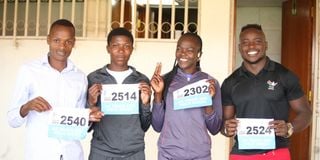Everyone has right to enjoy sports in a safe environment

From left: The 2021 World Under-20 1,500metre champion Vincent Keter, 800m athlete Sarah Moraa, World and Commonwealth Games 800m champion Mary Moraa and Commonwealth Games and Africa 100m champion Ferdinand Omanyala pose with their running bibs after registering for the third Athletics Kenya Track and Field Meeting at the Nyayo National Stadium on January 25, 2024.
What you need to know:
- Olympism seeks to create a way of life based on the joy of effort, the educational value of good example, social responsibility and respect for universal ethical principles
- It is our collective responsibility therefore to ensure that these rights are not abused, hence the matter of creating safe sports taking centre stage
- Safe sports is ensuring that how sports are offered does not expose those involved to harassment, abuse, harm, maltreatment, and violence
The landscape of sport has significantly changed over the years. From numerous major international multi-sport competitions, the inclusion of marginalized and vulnerable groups in elite sports and development including children and differently-abled persons has increased stakes with sports gaining grounds as an important social and economic contributor.
With this growth, the risks in sports have also increased, which stirred the sporting movement to prioritise the subject of safeguarding in sports.
The background stems from respect for universal fundamental human rights. The practice of sport is a human right. Every individual must be able to practice sport, without discrimination of any kind.
Olympism seeks to create a way of life based on the joy of effort, the educational value of good example, social responsibility and respect for universal ethical principles. It is also enshrined in the Constitution of Kenya -- Bill of Rights.
It is our collective responsibility therefore to ensure that these rights are not abused, hence the matter of creating safe sports taking centre stage. The concept was initially, widely used to protect children, but research and experience has shown that this goes beyond children, to all athletes and backroom staff.
Safe sports is ensuring that how sports are offered does not expose those involved to harassment, abuse, harm, maltreatment, and violence. It is about working with leaders, coaches, organizations, clubs, parents, carers, activity providers, instructors, and teachers to safeguard children and adults at risk, to support them in enjoying sports in a safe environment.
As NOC-K prides itself in being an athlete-centred institution, to put this in action, there must be demonstrated action towards protecting the welfare of athletes.
The impact of abuse and harassment on athletes is diverse and profound. An athlete participating in sports regards their participation as the most important thing, when you take that away, you are taking a huge part of their life. Studies done in this area have shown that the prevalent impact is dropout in sports and psychological issues. In extreme cases bodily harm and taking one's life have been reported. This warrants our collective attention.
NOC-K, leading the Olympic Movement as an action-oriented institution, activated the safeguarding programme in Kenya. Action taken include appointing and training safeguarding officers in sports under the IOC safeguarding course.
All multisport events since Tokyo 2020 require a policy and a safeguarding officer in each country delegation. Athletes are being made aware of forms of abuse, and how to deal with them when they arise. Mental health professionals are a must-feature for NOC-K programmes. The partnership with Chiromo Hospital Group has reinforced these efforts, offering neutral and professional practitioners to guide in these matters. NOC-K is taking it further by disseminating the knowledge to all national federations.
This weekend, NOC-K has brought together all member federations in a training on essentials of safeguarding athletes. The intent is to eventually, collectively, develop a Kenyan policy.
We call on all our stakeholders to collaborate to protect the integrity of sports, safeguard athletes and promote their welfare, as well as protect those at risk who are working within sports by supporting and complying to ethical, policy and legal guidelines.
Mutuku is the Secretary General of the National Olympic Committee of Kenya.





